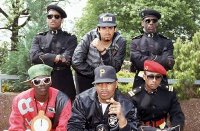

I think that I reflect on the current state of hiphop almost daily. It really affects me the hardest when a so-called "old-school" anthology music program is broadcast. I was a pre-teen when hiphop music first came on the scene and believe it or not it was always straddled with controversy. When groups like Grandmaster Flash and the Furious Five or The Funky Four(plus one more) were at the height of their popularity, most of the criticism dealt with music being "party" oriented or faddish. That was basically it...just too much about the party. The funny thing is that if you were to listen to these records today, you would swear that you're listening to a sermon. Sure these records did have live party tracks as background filler, but many times the listener would hear positive affirmations within these songs. "I don't do drugs because it's wack" or something along those lines was proclaimed and very rarely would it come off as corny. This period, however, was not considered the golden-age of hiphop music. The actual time period is actually open to debate amongst music critics and rap aficionados alike. Some say that this period was from 1987 through 1994 and others (including yours truly) believe that it was from 1989 through 1992.
One of the highlights during this period, was the advent of political or socially-conscious rap. Acts such as Public Enemy and the X-Clan(pictured above) literally set the hiphop scene on fire, with their incendiary, multi-layered lyrics and innovative sampling abilities. The funny thing is that I have often likened this particular genre as being true gangsta music. Now what do I mean by this. Currently, the gangsta music that we all know(and hate) has been stuck on stupid for approximately 15 years. As violent and as ignorant as the lyrical content may be, it is not threatening to this country's power structure. Public Enemy maintained a sizeable White fanbase while spouting pro-black lyrics....that my friend is gangsta. I remember during this period that African bookstores, clothing, medallions and political conversation were actually in abundance. This was shut down as a fad in about 2 years. Having the consumer to actually think is an extremely dangerous concept. The only explanation I can come up with regarding the demise of political hiphop is that Black folk treated the music as a fad and not the soundtrack to a legitimate movement. I also think that having a predominantly White consumer fanbase actually empathizing with a Black militant and/or political struggle was definitely not going to be promoted ad infinitum. So when you happen to download the latest Dipset effort, remember that there was a time when people actually cared what the hiphop artist was spouting out of his mouth as opposed to the bling that today's artist is putting in his mouth.

















No comments:
Post a Comment